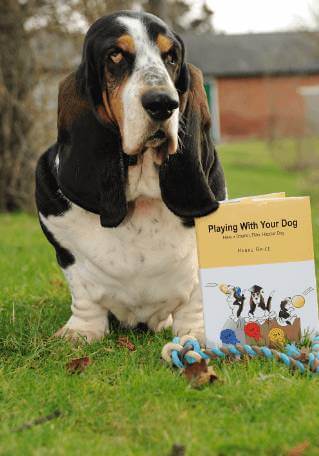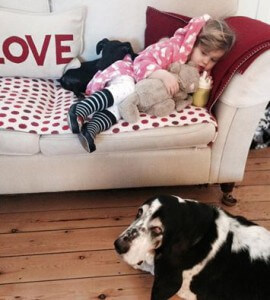There is plenty of anecdotal evidence from dog owners that suggest their pets have sniffed out or alerted in some way their human friend to an illness or disease. Indeed, in recent years there has been a rise in the number of dogs being trained to alert when an owner is likely to have an epileptic seizure, steady the nerves of students when cortisol levels rise or sniff out particular cancers – thanks to a ground-breaking study by Dr John Church, published in 2004, which claimed to prove in principle that dogs could detect bladder cancer. And then there’s the case of Oscar, the resident cat of a Rhode Island nursing home that ‘predicted’ the death of 25 elderly patients in 2007.
Did Oscar sense death was approaching? There’s little research into this, but scientists hypothesise that animals like Oscar, may sense and smell the organs shutting down as well as note the changes in our behaviour when we are ill.
So did my pets sense I was ill before I knew?
I write this while hooked up to various machines either monitoring or pumping me with fluids and antibiotics. That’s because two weeks ago I was rushed by ambulance into A&E with severe pneumonia and a type of ‘flu’. At first the doctors panicked thinking it was swine flu which meant I spent the first week being greeted by nurses and doctors in what looked like hazmat suits! But, thankfully, tests showed that my pig hugging habit hadn’t led to swine flu. 😉
Changes afoot…
Nevertheless, I did note changes in my cats and dogs in the lead up to my admission into hospital. It started with my toddler, she fell ill first. Now while my little human and animals all respect one another’s space, the dogs in particular started to want to sit close to her or touch / nudge her.
A few days later I was starting to feel unwell but continued with my work commitments. When I returned home, the cats (which tolerate one another) chose to sit on or next to me and spats – normally led by my female cat – suddenly ceased. Then the dogs started to whine if they couldn’t get close to me. My elderly dog would lay on my foot rather than the comfort of his bed placed just a few inches away. The puppy would nudge my back and lay behind me, while the other cat would fuss around my chest area. Without wearing my ‘behaviour hat’ (after all I was chilling on the sofa) I simply put this down to scent marking. That’s because I had been amongst many clients’ pets and figured my lot were simply swiping me with our household’s unique ‘clan’ odour, as behaviourist Sarah Whitehead puts it.
But the pets’ behaviour continued in this way for many days, always wanting to be close and particular attention was being drawn to my chest and back area.
Dogs and cats are great observers – they can read us humans like a book. Dr Patricia McConnell says: “Your dog is probably a far better observer than you are. We humans pay so much attention to language that it often interferes with our ability to see what’s happening around us.” Because our visual system is so highly evolved it can often override our more primitive senses of smell, touch and hearing – senses which are highly developed in our cats and dogs.
Moreover, we secrete information from our apocrine glands; in dogs the largest and most dense are located in the two anal sacs. This is the reason dogs sniff one another’s butt to gain information about the other during a greeting. Although in primates and foxes, this is largely odourless it’s believed by some that the smell produced comes from what the secretions feed – bacteria. Biologist Rob Dunn says; “Your dog stinks because it feeds special bacteria that produce an odour that, in turn, communicates a specific message to other dogs.” So perhaps, our bodies evolved the ability to feed bacteria in order to produce smells that signaled both who we are (in terms of our identity and relatedness) and how we are (in terms of our health). Dunn continues; “Because the bacteria need food and are influenced by our microbial health, they provide an honest signal, like a peacock’s tail, of our fitness. A sick peacock has an ugly tail, a sick dog, monkey or man, may well have an ugly odour.”
While my pets sense of smell may be one explanation for their dramatic change in behaviour, what about their abilities to detect my emotional state? Dogs and cats are sentient beings, so could my change in emotional state have impacted my pets’ behaviour?
Just like smiling, laughter or yawning, emotions can also be contagious and anecdotal evidence together with scientific research (Yong & Ruffman 2015) suggests that dogs show physical signs of empathy when someone or another animal is in distress such as licking, nuzzling that individual and so on, behaviours certainly exhibited by my own animals in the lead up to me being hospitalised.
When the inevitable happened and the paramedics arrived, my Basset who is a super-friendly chap kept his distance – and – according to the ambulance crew “looked concerned”. I was wheeled out of the house to the sounds of Howard howling which is out of character, while one of my cats attempted to get into the ambulance with me.
So were my own pets showing concern for their human? Or was their behaviour simply down to the dramatic change in my odour, body language, emotional state and / or the strange context to which this was all happening? Who knows really, but as I write this post from my bed I am told the cats remain on their truce, cuddling up to one another on my bed, and the dogs have settled down into a new routine without me.
Final thought…
When I think back to the weeks and days ahead of my hospital admission, there were subtle cues from my four-legged friends that I dismissed because my mind was preoccupied with work. So lessons have been learnt. If my pets ever start to nudge and swarm around me for days on end again, I will heed their warning and march myself off to the local GP quicker than you say cannula!
Learn more about our classes

Get Hanne's book, clothing and more
Hanne has a number of publications including her book Playing With Your Dog to help owners work out the games that are best suited for their pet to play throughout his life, from puppyhood to old age, available from Amazon. Check out Hanne's range of contemporary casuals The Collection – for pet lovers made from recyclable, organic materials that are sustainably sourced.



